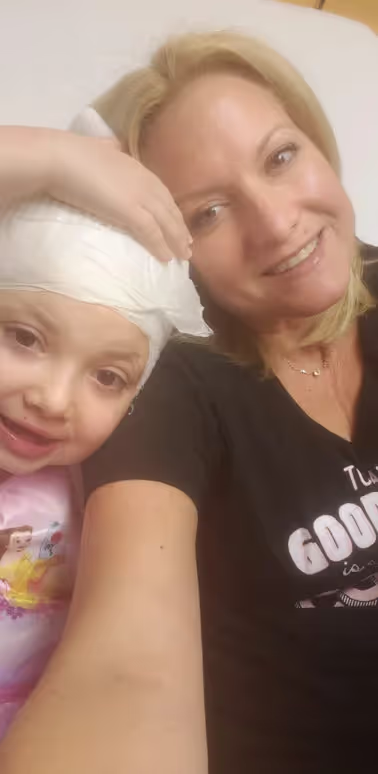Uncharted Waters: The Gap in Newborn Genetic Screening (1/5)
In the joyous journey of parenting, welcoming a child symbolizes a moment filled with hope and dreams. As Jessica cradled her new baby, Sophie, cherishing the unique euphoria of those first days, she, like many parents, trusted the healthcare system to provide the best for her newborn. This trust signifies an expectation that essential health screenings, including state-run newborn screening programs and baby DNA tests, are part of standard healthcare protocols.
However, Jessica's experience shed light on a critical gap in the current healthcare approach, emphasizing the urgent need for comprehensive child genetic testing. This is especially crucial when considering pediatric conditions, where early and accurate genomic testing can make a world of difference.
Sophie's Long Road to a Diagnosis
Initial Concerns and Misdiagnoses

When Jessica first observed Sophie at approximately 4.5 years of age exhibiting persistent coughing symptoms, she could not have anticipated the extensive medical odyssey that lay ahead.
Initially, a simple visit to the pediatrician diagnosed it as a virus. However, after weeks without improvement and an alarming progression in symptoms such as persistent fever, a chest X-ray was ordered. The diagnosis shifted to pneumonia. But even after treating this condition, Sophie's health did not restore to normal. She began showing distressing symptoms: dark circles under her eyes, a distended belly, and episodes of vomiting. Despite multiple visits and a pressing plea from Jessica, the pediatrician remained dismissive, attributing the symptoms to post-pneumonia complications.
Jessica's persistence eventually led to blood work, revealing elevated liver enzyme levels. This discovery spiraled into multiple referrals, from infectious disease specialists to gastroenterologists. Each stop on this medical journey offered different assessments, diagnoses, and treatments, with the young Sophie undergoing multiple tests and procedures, yet no clear answers were provided.
The Quest for a Proper Diagnosis
Amid this taxing journey, Jessica constantly advocated for her daughter, seeking opinions from over 30 different neurologists, attending numerous conferences, and engaging with various medical experts across specialties. When Sophie displayed unexpected strength at a conference by lifting her brother, Dr. Ryder, a myositis specialist, immediately advised a consultation with a neurologist.
Numerous spinal taps, muscle biopsies, and consultations later, Sophie's health odyssey took them to a Children’s Hospital that specialized in rare and undiagnosed diseases. Here, a significant inquiry arose: had genetic testing ever been considered? Although initially faced with insurance challenges, Jessica's perseverance led to Sophie's admission to the ER, where genetic testing was finally ordered and covered by insurance.
A Heartbreaking Revelation
Three agonizing months later, a genetic counselor revealed the devastating news: Sophie had a rare form of Muscular Dystrophy linked to the CAPN3 gene, known as Limb Girdle Muscular Dystrophy. The prognosis was grim, forecasting a future where Sophie might lose her mobility and arm functions.
The manner in which this life-altering news was delivered lacked sensitivity, leaving Jessica with a lack of guidance or a clear care plan. Doubts and skepticism about the genetic testing results from other physicians further added to their distress. It was only after a second muscle biopsy and subsequent recommendations that Jessica felt a glimmer of hope. Sophie displayed improvements after her medications, especially steroids, were revised.
Sophie's story underscores the critical importance of comprehensive genetic testing for children, even before displaying unexplained symptoms. Without it, she would still be battling an incorrect diagnosis, with treatments that were more detrimental than beneficial.
The Present Landscape of Newborn Genetic Testing
After birth, infants typically undergo a series of health screenings, with the aim of identifying common potential health concerns. Yet, the scope of these assessments can differ widely based on geographical region, hospital procedures, and occasionally, the discretion of the attending doctor.
Notably absent in many places is comprehensive newborn genetic testing, which can offer insights into a baby's DNA. This lack of a consistent approach, together with limited parent awareness of baby DNA testing, presents a significant oversight in pediatric healthcare.
Bridging the Gap in Infant Genomic Testing
While traditional health screenings offer an initial glance at a child's well-being, genetic testing provides an in-depth look into their genetic makeup. Such genomic testing can shed light on a child's predisposition to certain pediatric conditions or other potential health challenges they may face later.
The problem? A significant number of parents, including Jessica at the time, remain unaware of the concept of child genetic testing and its potential advantages in identifying rare child conditions.
Amplified Concerns for Donor-Based Conceptions
The intricacies of genetics become even more pronounced in the world of donor-based conceptions. These children, woven from a tapestry of diverse genes, may harbor health risks unbeknownst to their parents. This blog article sheds light on this amplified need, emphasizing the importance of exhaustive genetic analyses for donor-conceived offspring.
Introducing Fore Genomics: A New Era in Genetic Testing
A Revolution in Newborn Genetic Testing
Fore Genomics is redefining the norms and standards associated with genetic testing for newborns, children, and infants. By providing a comprehensive and holistic genetic profile of newborns, it sets a new precedent for early diagnosis and intervention.
A Continuous Guardian Angel for Parents
What sets Fore Genomics apart is its commitment to ongoing care and accuracy. Fore Genomics' tests 100% of a child's DNA, storing the capability for a lifetime of learning in their healthcare journey. Recognizing the dynamic nature of genomic science, Fore ensures that a child's genetic profile is updated annually, integrating the latest scientific discoveries and advancements. This approach not only provides parents with the most current and accurate information but also transforms Fore into a constant guardian angel.
Parents, armed with this tool, are no longer left in the dark regarding their child’s genetic health. We create a robust support system made up of compassionate genetic counselors and physicians that empowers families to make informed decisions.
Transformative Impact on Children’s Health Journeys
Sophie’s story serves as a powerful testimony to the transformative potential of innovative genetic testing solutions like Fore Genomics. For families navigating the labyrinth of misdiagnosis and undiagnosed symptoms, timely access to a comprehensive genetic testing tool could be a game-changer.
In Sophie’s case, early intervention through accurate genetic profiling could have significantly altered her health trajectory, steering her away from a series of misdiagnoses and unnecessary treatments. The impact of such a tool is profound, with the potential to not only streamline the diagnostic process but also to usher in a new era of personalized, proactive healthcare to promote wellness for newborns and children.
Fore Genomics emerges not just as a product, but as a paradigm shift, championing a future where child genetic testing, infant genetic testing, and newborn genetic testing are integrated seamlessly into pediatric care. Its promise to recalibrate the landscape of genetic testing and provide annual updates positions Fore Genomics as an indispensable tool, ensuring that no stone is left unturned in safeguarding the health and well-being of the youngest members of our society.
For those looking for deeper insights into genetic screenings, check out our informative E-book, Parent’s Guide to Newborn and Infant Genomics.
Part 1: Uncharted Waters: The Gap in Newborn Genetic Screening
Part 2: The Unseen Path - Transitioning from a Healthy Baby to a Watchful Childhood
Part 3: Navigating the Labyrinth: The Quest for a Diagnosis
Part 4: Beyond the Norm - The Urgent Call for Precision Medicine


